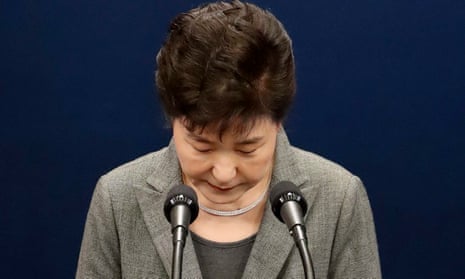The disgraced South Korean president, Park Geun-hye, has offered to resign and called on parliament to arrange her exit amid a corruption and cronyism scandal that has all but destroyed her administration.
Speaking in a nationally televised address on Tuesday, Park – whose single five-year term will not be officially over until early 2018 – asked the national assembly to set a new deadline for the end of her turbulent presidency.
“I will leave to parliament everything about my future including shortening of my term,” Park said in her third public address since the scandal broke.
“Once lawmakers come up with measures to transfer power in a way that minimises any power vacuum and chaos in governance, I will step down,” she said.
The offer by Park, South Korea’s first female president, came after another weekend of huge protests in Seoul and other cities calling for her immediate resignation over her role in an influence-peddling scandal centred on her longtime friend Choi Soon-sil.
Opposition lawmakers immediately rejected the offer, describing it as a last-ditch attempt to avoid the humiliation of impeachment.
South Korea’s three biggest opposition parties claimed they had won the support of enough lawmakers from Park’s ruling Saenuri party to push ahead with impeachment. Just before Park’s address on Tuesday local media reported that an impeachment vote could come as early as Friday.
Park Kwang-on, a lawmaker with the main opposition Democratic party, said: “(Park) is handing the ball to parliament when she could simply step down.
“She is asking the parliament to pick a date for her to resign, which she knows would lead to a discussion on when to hold the presidential election and delay everything.”
Park has twice publicly apologised over her close ties to Choi, a longtime confidante who has been arrested for fraud and abuse of power.
Choi, 60, allegedly used her relationship with Park to coerce donations from major South Korean companies, including Samsung – the country’s largest family-run conglomerate – to nonprofit foundations she set up and used for personal gain.
In an attempt to quell criticism of her conduct in the presidential Blue House, Park, who has resisted calls for her resignation and denied any criminal activity, had promised to submit herself to a special investigation.
This week, however, her lawyers rejected requests for Park to submit herself to questioning by the Choi prosecutors. Instead the 64-year-old Park will prepare for an investigation by a special prosecutor that is expected to begin in December, according to her legal team.
On Saturday hundreds of thousands of South Koreans took to the streets for the fifth weekend in a row to call for Park’s resignation. Organisers said the crowd totaled 1.5 million, though police estimated 260,000 attended.
No South Korean president has failed to complete a term since the current democratic system was introduced in 1987. If Park is impeached or resigns an election would be held in 60 days to nominate a new president to serve a five-year term.
Choi, who has never held public office and does not have security clearance, is also alleged to have influenced government policy, including in the economic and security spheres, and Seoul’s hardline stance towards North Korea.
Park acknowledged she was foolish to depend so heavily on Choi’s counsel but denied any role in pressuring companies to contribute money to her friend’s foundations.
Their friendship goes back to Park’s days as acting first lady following the assassination of her mother. Five years later, in 1979, Park’s father, the then South Korean leader Park Chung-hee, was killed by his own head of intelligence.
Now the scandal dubbed Choi-gate has shredded any last trace of political credibility Park enjoyed as the daughter of Park Chung-hee, who, despite human rights abuses, is credited with spurring the country’s transformation into an economic power, with living standards far exceeding those in the neighbouring North.
Last week Park Geun-hye’s approval rating fell to just 4% percent in a Gallup poll – an all-time low for any democratically elected South Korean president.
She would be the first South Korean leader to resign since the country’s first president, Syngman Rhee, quit and then fled to Hawaii amid a popular uprising in 1960.
Commentators said Park appeared to be deliberately complicating discussions over her future after weeks of daily criticism in the media.
“She doesn’t want the parliament to impeach her and she doesn’t think that the parliament can soon reach an agreement, so she is making things complicated and trying to shift some of her blame to parliament,” said Shin Yul, a professor of political science at Myongji University.
